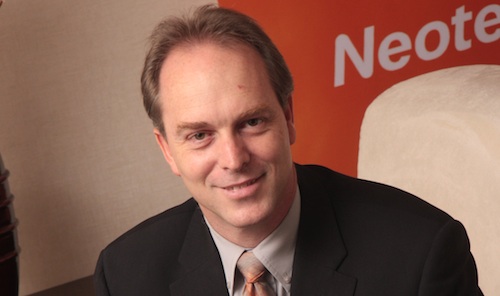
Neotel’s access to prime spectrum in the radio frequency band used for analogue terrestrial television broadcasts could give it a strategic advantage over its rivals.
This is as the world begins moving to the next generation of wireless broadband based on technology called long-term evolution (LTE).
Neotel has a prime chunk of about 10MHz of spectrum in the 800MHz band — the same band used for ultra-high frequency television broadcasts — made up of two non-contiguous chunks of 5MHz each.
The operator eventually wants to utilise the spectrum to offer wireless broadband using LTE, which is the successor to the wireless broadband technologies deployed by SA’s mobile operators.
LTE will pave the way to so-called “fourth-generation” wireless technologies, which will eventually offer theoretical throughput speeds in excess of 100Mbit/s.
Though television broadcasters currently use the 800MHz band, Neotel was given special dispensation several years ago by the Independent Communications Authority of SA (Icasa), which manages SA’s radio frequency spectrum, to coexist with broadcasters in the band.
Neotel was allowed access to spectrum in the band after demonstrating to Icasa that it could use it without interfering with television broadcasts.
It has used the frequency to roll out the country’s only code division multiple access (CDMA) network, which provides basic voice and data services to retail consumers.
The 800MHz band must be freed up for telecommunications operators by no later than mid-2015, once the country has migrated to more “spectrally efficient” digital broadcasts.
However, Neotel’s early access to the band could give it a big advantage over its rivals.
Though chief operating officer Angus Hay says Neotel hasn’t yet drawn up a comprehensive plan for rolling out LTE, he says it will migrate its CDMA customers to LTE in the long term.
It’s not yet clear if the company could get access to additional spectrum in the 800MHz band before the migration to digital television is completed. However, chief corporate services officer Tracy Cohen says the company is keen to apply for more spectrum in various bands.
But, she says: “There’s no framework right now to engage with Icasa on spectrum.”
Hay says that because Neotel has already created a precedent by building a telecoms network in spectrum used by broadcasters, he believes there is no reason why the company wouldn’t be able to deploy LTE in the band before the conclusion of digital migration.
He says it would be easier to do this in SA given that the density of terrestrial television broadcasts is a fraction of what it is in Europe — in other words, SA has far fewer terrestrial television channels, meaning the spectrum is underutilised. “There’s lots of headroom to become more efficient,” Hay says.
If Neotel is able to build an LTE network at 800MHz before rival operators can get access to the band, it could help it make up lost ground in the battle for market share, including in the retail consumer space where it has struggled to gain traction.
None of Neotel’s rivals has access to frequency spectrum below 900MHz. And both MTN and Vodacom can’t reassign their 900MHz allocations for broadband in dense urban areas as they’re already using it extensively for legacy voice.
Cell C, which also has an allocation at 900MHz, has recently “refarmed” a portion of this frequency for its new wireless broadband network. It’s been able to do so because it has fewer voice customers in the band compared to MTN and Vodacom, which have built their 3G networks at 2,1GHz.
The relatively lower frequency penetrates buildings more easily and requires fewer base stations, especially in outlying areas, making it cheaper to build wireless broadband networks.
But consumers shouldn’t expect next-generation networks from Neotel, or any other operator, any time soon. LTE is still in its infancy, with modems and handsets that support it only expected to start gaining widespread market adoption in a couple of years.
However, if Neotel plays its cards correctly it could engineer its way into a strategically advantageous position in an increasingly cutthroat market. — Duncan McLeod, TechCentral
- Subscribe to our free daily newsletter
- Follow us on Twitter or on Facebook




